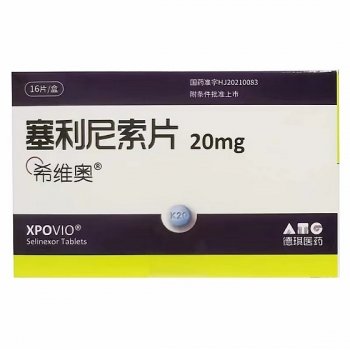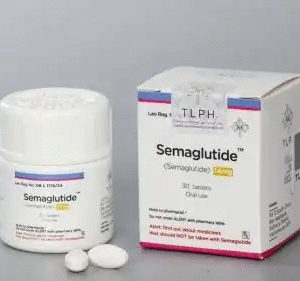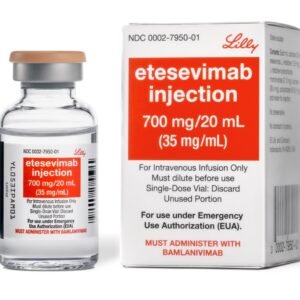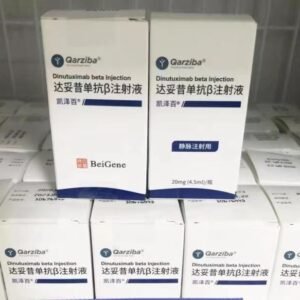Selinexor Tablets
Function and indication:
Sivio is used in combination with dexamethasone for adult patients with relapsed or refractory multiple myeloma who have been previously treated and are refractory to at least one proteasome inhibitor, one immunomodulator, and one anti-CD38 monoclonal antibody. Selinexor tablets are used to treat refractory relapsed diffuse large B-cell lymphoma (including those transformed from follicular lymphoma).
Adverse reactions:
Overview of sexual characteristics The sexual characteristics of Sivio combined with dexamethasone have been evaluated in 214 patients with multiple myeloma (including 83 patients with five-drug refractory disease). The most common adverse reactions (≥30%) are nausea (75%), thrombocytopenia (75%), fatigue (66%), anemia (60%), decreased appetite (56%), weight loss (49%), diarrhea (47%), vomiting (43%), hyponatremia (40%), neutropenia (36%), and leukopenia (30%). The most commonly reported serious adverse reactions (≥3%) were pneumonia (7.5%), sepsis (6.1%), thrombocytopenia (4.7%), acute kidney injury (3.7%), and anemia (3.3%). Clinical Trial Experience Because clinical studies are conducted under different conditions, the incidence of adverse reactions observed in the clinical studies of a drug cannot be directly compared with the incidence of adverse reactions observed in the clinical studies of another drug and may not reflect the incidence observed in clinical practice. Description of Specific Adverse Events Infections were the most common non-hematologic toxicity; 53% of patients had infections, of which 22% were Grade 3 or 4. The most commonly reported infections were upper respiratory tract infections and pneumonia (in 15% and 13% of patients, respectively). Serious infections occurred in 25% of patients, and only 3% of patients had fatal infections. Infections led to discontinuation of dosing in 7% of patients, suspension of dosing in 19% of patients, and dose reduction in 1% of patients. Thrombocytopenia Thrombocytopenia occurred in 75% of patients, and severe thrombocytopenia occurred in 5%. Grade 3 or 4 thrombocytopenia occurred in 65% of patients, and 5% of these patients reported concurrent severe and/or grade 3 or higher bleeding events (complicated by +5 days). Thrombocytopenia led to discontinuation of dosing in 3% of patients, suspension of dosing in 22% of patients, and dose reduction in 32% of patients. Thrombocytopenia can be controlled by dose adjustment, supportive care, and platelet transfusions. Patients should be monitored for bleeding symptoms and signs and evaluated promptly (see [Dosage and Administration]). Neutropenia Neutropenia occurred in 36% of patients, of which 25% were grade 3 or 4. Severe neutropenia occurred in 1% of patients. No patient discontinued treatment due to neutropenia, and neutropenia led to discontinuation of treatment in 2% of patients and dose reduction in 6% of patients. Febrile neutropenia occurred in 3% of patients, all of which were grade 3 or 4. Severe febrile neutropenia was reported in 2% of patients, with less than 1% of patients discontinuing treatment, interrupting treatment, or reducing doses, respectively. Of the 53 patients who developed Grade 3 or higher neutropenia, 6 (11%) patients reported concurrent severe and/or Grade 3 or higher infections (complications were defined as XxX5 days). The most commonly reported Grade 3 or higher infections included urinary tract infection (3 patients) and sepsis (2 patients). Anemia Anemia occurred in 61% of patients, of which 44% were Grade 3 or 4. Severe anemia occurred in 3% of patients. Anemia led to less than 1% of patients discontinuing treatment, 4% of patients suspending the medication, and 1% of patients reducing the dose. Anemia can be controlled by adjusting the dose and transfusion and/or erythropoietin administration according to medical guidelines6 For dosage adjustment principles, see [Dosage and Administration].
Contraindications:
This product is contraindicated in patients with known severe allergies to Xpovio or its ingredients.
Share:
Products
Our offers
Health Classification
Let us work together to protect precious health






























